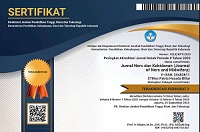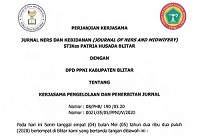The Effectiveness of In-Network Methods (Whatsapp Group) to the Attitudes of Covid 19 Prevention of D3 Midwifery Students STIKes Patria Husada Blitar
DOI:
https://doi.org/10.26699/jnk.v7i3.ART.p410-414Keywords:
Covid-19, Whatsapp, AttitudeAbstract
Covid-19 is a new type of virus that easily spreads to humans and causes serious infections such as pneumonia. In Indonesia, the PSBB (Large-Scale Social Restriction) was implemented as an effort to suppress the spread of the corona virus. All activities outside the home are stopped or reduced until the pandemic has subsided. Some regions have implemented government policies to dismiss their students and begin the application of learning methods using an online or online system. Methods: The design of this study used a quasy experiment with a pre-post group design approach without control group design. A sample of 19 respondents was given material about the definition of covid-19, prevention of covid-19. The sampling technique used purposive sampling. The data collection method used a questionnaire in the form of google form given to respondents before treatment and after treatment. Data analysis was divided into 2, namely univariate and bivariate. Univariate in the form of frequency distribution to measure the characteristics of respondents, namely age, parent's occupation, and bivariate using the Wilcoxon Signed Rank Test statistical test aimed at distinguishing attitudes before and after treatment. Results: The Wilcoxon test proved that there was a difference between before and after treatment, namely α (0.05) ˃ 0.001. Discussion: Communication with social media via the internet (whatsapps) affected the attitudes of respondents in preventing covid-19 transmission and increase information and understanding for respondents.References
BNPB. (2020). Covid 19 di Indonesia, Available at 20 Juni (2020), (www.covid19.go.id)
Delam H, Eidi A (2019) ‘WhatsApp Messenger role in Coronavirus Disease 2019 (COVID 19) Pandemic’ Journal of Health Sciences & Survailance System, 8(4), pp.183-184. Doi: 10.30476/JHSSS.2020.87202.1107. Available at: 21 Juli (2020 ) (https://jhsss.sums.ac.ir/article_46964.html)
Effendy, Nasrul. (2012). Dasar ± Dasar Keperawatan Kesehatan Masyarakat (Ed. 2). Jakarta: EGC.
Effendi, M. 2010. Peranan Internet sebagai Media Komunikasi. Jurnal Dakwah dan Komuniaksi, 4(1).
Gikas, J., & Grant, M. M. (2013). Mobile computing devices in higher education: Student perspectives on learning with cellphones, smartphones & social media. Internet and Higher Education. https://doi.org/10.1016/j.iheduc
Kemendikbud (2020). Penyesuaian Keputusan Bersama Empat Menteri tentang Panduan Pembelajaran di Masa Pandemi COVID-19. Available at: 28 April (2020). (www.kemendikbud.go.id)
Kemendikbud (2020). 19 Juni 2020: Kemendikbud Luncurkan Tiga Kebijakan Dukung Mahasiswa dan Sekolah Terdampak COVID-19. Available at 20 Juni (2020). (https://bersamahadapikorona.kemdikbud.go.id/kemendikbud-luncurkan-tiga-kebijakan-dukung-mahasiswa-dan-sekolah-terdampak-covid-19/)
Kominfo. (2019). Kominfo, WhatsApp Kenalkan Literasi Privasi Dan Keamanan Digital, Available at 20 Juni (2019), (kominfo.go.id).
Kosasih, E. J., Setianti, Y., & Wahyudin, U. (2017). Pengaruh kredibilitas petugas terhadap sikap kepatuhan pasien tbc pada pemeriksaan dahak. Jurnal Kajian Komunikasi, V ol.5, No.1, pp.1–10
Media Indonesia (2020). Pembelajaran daring. Available at: 21 Juli (2020). (https://mediaindonesia.com/read/detail/298964-covid-19-dan-pembelajaran-daring)
Notoatmodjo S. (2012). Promosi Kesehatan dan Perilaku Kesehatan. Jakarta: PT Rineka Cipta.
Purwanto. (2009). Evaluasi hasil belajar. Surakarta: Pustaka belajar
Sari, LT (2020). Pengaruh Cyber Counseling Terhadap Sikap Pencegahan HIV/AIDS di SMK PGRI 3 Blitar. Jurnal Penelitian Kesehatan, Jilid 7, No.2, hh: 63-70
Sari, IY (2020). Pneumonia COVID-19 Coronavirus disease 2019. Available at: 21 Juli (2020). (www.rs-soewandhi.surabaya.go.id)
Satgas Penanganan Covid-19. (2020). Peta Sebaran Covid-19, available at: 20 Juni (2020), (https://covid19.go.id/peta-sebaran)
Wawan A & Dewi (2010). Teori dan Pengukuran Pengetahuan, Sikap dan Perilaku Manusia. Yogyakarta : Nuha Medika.
WHO (2020). Coronavirus disease (COVID-19) pandemic. Available at: 25 Juli (2020) (www.who.int)
Wong KP, Bonn G, Tam CL, Wong CP (2018) ‘Preferences for Online and/or Face-to-Face Counseling among University Students in Malaysia’, Frontiers in Psychology, 9(64), doi: 10.3389/fpsyg.2018.00064. PMID: 29445352; PMCID: PMC5798405 Available at: 25 Juli 2020 (https://www.ncbi.nlm.nih.gov/pmc/articles/PMC5798405/#)
Downloads
Published
How to Cite
Issue
Section
License
Copyright (c) 2020 Jurnal Ners dan Kebidanan (Journal of Ners and Midwifery)

This work is licensed under a Creative Commons Attribution-ShareAlike 4.0 International License.






